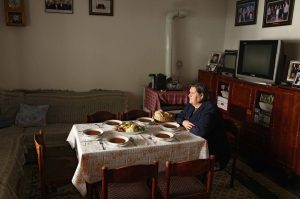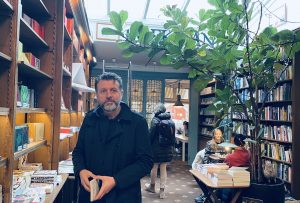On the fifteenth anniversary of Kosovo’s independence, a book about two mothers who lost their loved ones during the war has been translated into Dutch and is being promoted in The Hague.
The city is filled with tanks, armored cars and soldiers. Shots of machine guns and mortars are heard. Mother is talking on the phone. We haven't run away yet, they have surrounded all of Kosovo, she answered the insistent voice of the father.
This is how Ag Apolloni recounts a sequence of his experiences from the Kosovo war in his novel Glimmer of Hope, Glimmer of Flame. But this documentary novel is not all about his own war experiences. In fact, the novel focuses on the tragic tales of two Kosovar mothers, Ferdonija and Pashka, whose loved ones disappeared in the war.
It’s a book that talks about two Kosovo-Albanian mothers, and which starts and ends at the Cathedral of Mother Teresa – named after the most famous mother that Albanians gave the world, as Apolloni likes to describe it.
The novel was published in 2020 but has been translated into Dutch in honour of the 15th anniversary of Kosovo’s independence, and was promoted in The Hague on Friday.
Ag Apolloni told our editor: “I had found the topic, I was ready to write the book about Ferdonije, but I could not leave aside the story of Pashka.” He tells about how the idea for the book came after an invitation he received from a friend to visit Ferdonije.
She had walked with a ghost’s steps in-between the night and the day. […] Sitting in their graves, she had cried for her dead children. […] Did she lose her mind before she burned herself? No. Death had sobered up even Don Quixote, let alone her, who was always with a sober mind.
When Apolloni was a student, he had read a story in the corner of a newspaper about how Pashka had committed suicide, and he remained puzzled by the disregard that the story had been given in Kosovo. No one dealt with it. The news had spread that the woman had gone crazy and had killed herself.
“But only intelligent people commit suicide. I had read this from books about suicide and heard it in many cases. Fools die, get killed, but suicide is philosophical,” Apolloni says.
After the story of Pashka comes the story of Ferdonije, the resilient mother who resisted the oblivion of time to tell the story of how Serbian forces took away and disappeared her husband and four sons, so that the collective memory of society never erases her story.
You are not lost ... You are always here. Always. For as long as the earth and the sky exist, you will exist.
These are the words with which Feronija ends her story.

Ferdonije Qerkezi’s ritual dinner with her missing husband and four sons abducted by Serbian forces in 1999. Bodies of her sons have returned. Her husband and other two sons are still missing. Over 1600 people are still missing in Kosovo, 24 years after the war. Photo: Artan Korenica
Special meaning of The Hague
The translation of the book into Dutch and its promotion in The Hague has a special symbolism for him. The Hague is where former Kosovo Liberation Army commanders, who became prominent political figures after the war, are being held in detention and awaiting the start of the trial in a couple of weeks.
“We should show those in The Hague, in the Netherlands, and everywhere in the world, that the Serbs were to blame for the Kosovo tragedy and that we were the victims,” Apolloni says in a slow but determined voice.
“As far as the war is concerned, it should be well known who was the aggressor and who was the victim, and I think it is very important that this is broadcast here in The Hague, that they know this, otherwise they might take us as criminals – and we were the victims,” he adds.
He notes that The Hague also remains a symbol of the trial of Slobodan Milosevic, the main culprit for the war in Kosovo, who “ironically died a few days before his guilty sentence was announced”. He pauses for a second and then adds: “I think he would have been found guilty.”
“I think that the creation of the Special Chambers here has created some confusion about the just and unjust of this war. I hope that this will be clarified, but for now it has caused some kind of confusion,” says Apolloni.

Ag Apolloni in the interview with Prishtina Insight. The Hague, February, 2023. Poto: Blerta Begisholli/BIRN
Calling criminals by their name
The book mentions specific names of Serbs who committed crimes in Kosovo. It names Vuk Mirkovic and Dragan Racic as two of the Serbs who took Ferdonie’s four sons and husband from the house, and who never returned.
After Ferdonije’s narration about them, Apolloni got interested in finding out where they were now, if they were imprisoned or living free lives.
He found out that both of them are in Serbia, living normal lives, have Facebook pages, and don’t seem to be bothered by the crimes they committed in Kosovo.
“It is strange that one of them is an actor and entertains the Serbian audience with anecdotes. He is a comic actor, that is, after the tragedy he had caused, he still continues to laugh and makes others laugh,” says Apolloni, while one side of his lips move, as to show the irony.
“Who would you like to read this book?” we ask.
“These two that I mentioned,” he quickly responds. “And all Serbs in general.”
He adds that in the Netherlands there is a need to read this book a lot as well, because of the presence of the courts, tribunal and the Special Chambers.
Beyond that, the parallels with Greek mythology in the story of Nioba and the broader history of loss and suffering make the story interesting for a broader audience.
In a conversation between Gazi and Dritan in an excerpt from the book, while Gazi is confessing the torture done to him by Serbian police, he says:
– The one who tortured me, I have fixed his face. He had blue eyes. I still have those eyes in my mind.
– Would you like to kill him?
– No man. I would only like to see him and ask him if he has a guilty conscience for what he did.
– […] He initially killed his conscience, then he came to kill you, said Dritani.
Fear of the ‘snow of forgetfulness’
The book ends with these words: “When we returned to the Mother Teresa Cathedral from where we left in the morning, the snow on the sidewalk had melted. But there are other flakes that continue to fall heavily: dismissive flakes of a SNOW OF FORGETFULNESS”.
Apolloni says that he fears that, only 24 years after the war in Kosovo ended, people have started to forget what happened. Normal relationships between two societies or two countries cannot be built on the basis of forgetting, but of remembering, forgiving and understanding, he says.
For him, this snow of oblivion, these falling snowflakes, are symbolically a kind of revolt, not to forget the past.
An institution for the collection of the tragic stories, a museum of war, a lawsuit against the state of Serbia, these should have been some of the steps Kosovo institutions should have taken, but have not, according to him.
“Forgiveness does not raise the dead,” reads the book. Denunciation of war crimes should be done, not so much for those who have already passed away, as for those who live with the criminals, without knowing anything, Apolloni says.
“I don’t expect [current Serbian President] Vucic ever to apologize, I think he’s a psychopath. Yes, you can include that. But I think that those who come after him will do this,” Apolloni concludes.
He remains with the hope that a Serbia that wants to join a Europe that punishes crime will eventually apologize.





